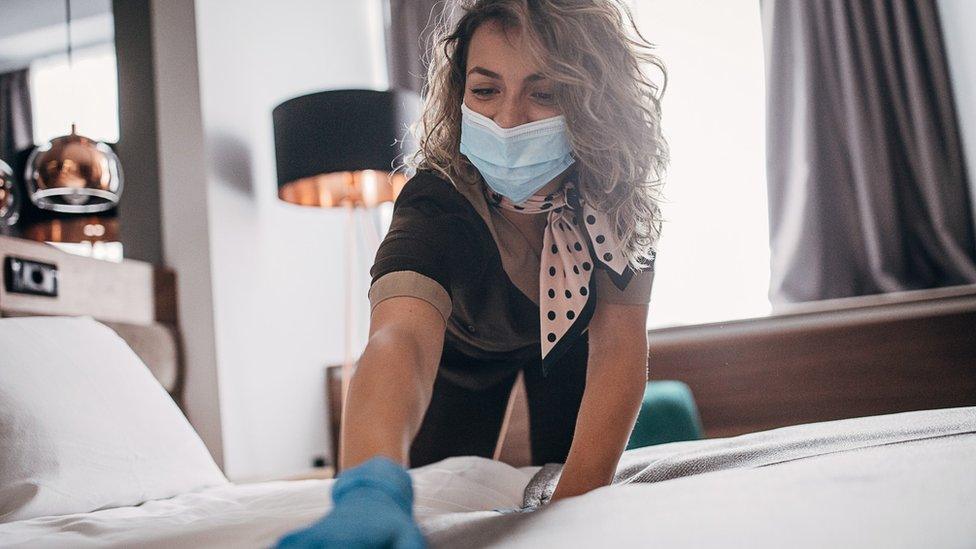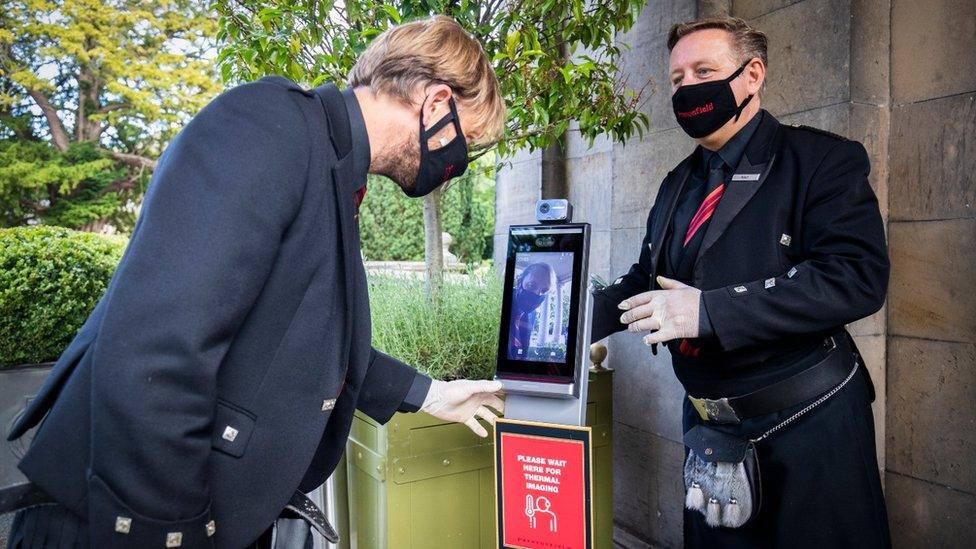Broken city breaks leave hotels half empty
- Published

A new study finds Scottish city hotel room rates are sharply down, and with so many empty rooms, revenue more so.
Even with a Covid-19 vaccine, a return to 2019 levels is expected to take four years, with London struggling most. The business travel market may never recover.
Rural hotels appear to have done much better, with a staycationer preference for going somewhere quiet, and especially for fresh air by the seaside.
If you want an evening meal in a restaurant, for now, you're out of luck. That's unless you book into the hotel where your eaterie of choice is located.
It sounds a high price to pay, but it may be much less than you might think. Room rates have plummeted.
That's good news for those willing to take the risk of venturing out and staying in a hotel, including some whose work requires them to do so.
To reduce infection risk, hotels are investing in contactless check-in and keys, digital concierges and, with comedy potential, interactive devices in your room.
But it's really bad news for hoteliers. While pub licensees and restaurant owners are to the fore in warning of grave danger to their businesses, hotels have a lower profile.
That's partly because some hotels have been doing well since lockdown was eased. With staycations booming, rural hotels, and even more so remote coastal ones, have been enjoying healthy occupancy rates.
Where recruitment of EU nationals has become very difficult, the labour market has delivered a rich choice of home-grown talent to work wherever there's work, including remoter locations.
Festival bonanza
But it's a very different story in city hotels. They often rely on business travel through the week, but that means meetings and conferences, which aren't happening. At the weekend, the leisure city break market checks in, but the appeal for them would normally be music, theatre, nightlife and shopping.
PwC, the business advising firm, has run the numbers and published them today in their 2020-21 forecast. They're no less startling than we've come to expect from the economy this year.
In Edinburgh, the average cost of an overnight stay has fallen by around a third this year, to £70 per room. That still leaves it the UK's third most expensive city location after London and Brighton.

Hotels have invested in equipment such as temperature checkers
The cancellation of its annual festival bonanza meant that the Scottish capital took the biggest hit of the 24 cities surveyed. It has also been significantly more dependent on international guests, and they were notably absent.
The metric used by the industry is known as RevPAR - revenue per available room. That takes in the impact of lots of rooms being empty. In Edinburgh, occupancy in July halved from the year before, to 40%.
So with prices also down, RevPAR was down 63% in July. You can be sure there was a bigger fall in non-festive August.
Glasgow is even more dependent on conferences, nightlife-based city breaks and big concerts. The average room cost the average guest below £59. Occupancy was down to only 24%, and RevPAR was at merely £24.
Aberdeen's hotels were already in a fragile state. Although there's been an expansion of capacity, the past six years have seen a sharp cut in oil industry spend on travel. It has never come close to the central belt cities for a weekend city break market.
The PwC annual study of July activity in 2019 came just ahead of the city's major conference centre re-opening, following a big refurbishment.
So the impact of the Covid crisis this summer appeared to be less marked. Occupancy fell from 65% in July 2019 to 44% this year, and RevPAR was down only 1% to £55.
Business as usual
If you're wondering about Dundee, Inverness, Stirling and Perth, you'd better ask PwC, whose study doesn't include the smaller cities. My guess is that they have more accessible rural hinterlands, and depend less on nightlife and business travel, so they may not have taken as big a hit as the bigger cities.
Where does this leave PwC's forecast? Not in a good place. After nearly 50 years of this annual survey, the outlook has never been worse.
The growth in occupancy across the UK in 2021 is expected to be 55%, up from 42% in the year to last July. It looks like four years until travel numbers recover to pre-pandemic levels.
London looks set to take the biggest hit, having vast capacity aimed at huge visitor numbers from around the world and around the UK, for both business and leisure.
Revenue per available room is expected to fall below £29 this year, down by £100. If a vaccine proves successful, the forecast is for 2021 to see that rise to £65. But building confidence and recovery, as potential guests hold back on spend, will take a lot longer.
For much business travel, now that we have had to become more used to Teams, Zoom and FaceTime, the role of the conference and face-to-face meetings may never recover.
What does this mean the industry will have to do, to survive and to win business back? I intend to return to that question before long, with the latest evidence on potential visitor preferences, and calls for an expensive set menu of tax cuts.
